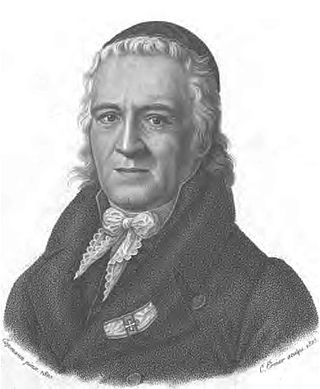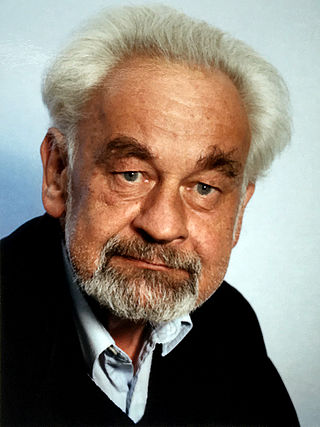Related Research Articles

Johann Augustus Eberhard was a German theologian and "popular philosopher".

Paul Nicolai Hartmann was a Baltic German philosopher. He is regarded as a key representative of critical realism and as one of the most important twentieth-century metaphysicians.

Ernst Alfred Cassirer was a German philosopher. Trained within the Neo-Kantian Marburg School, he initially followed his mentor Hermann Cohen in attempting to supply an idealistic philosophy of science.

Karl Leonhard Reinhold was an Austrian philosopher who helped to popularise the work of Immanuel Kant in the late 18th century. His "elementary philosophy" (Elementarphilosophie) also influenced German idealism, notably Johann Gottlieb Fichte, as a critical system grounded in a fundamental first principle.
Heinz Heimsoeth was a German historian of philosophy.

Josef Simon was a contemporary German philosopher and professor of the University of Bonn, born in Hupperath. He wrote extensively on metaphysics, epistemology, the philosophy of German idealism and various philosophers, mainly Kant, Hamann and Nietzsche. Perhaps Simon's most influential work has been in the philosophy of language. His main work, Philosophie des Zeichens, has been influenced by, among others, Kant, Hegel, Peirce and Wittgenstein, Hamann, Humboldt or Nietzsche.
Michael Hissmann was a German philosopher, an advocate of French sensualism, and a radical materialist who translated Condillac, Charles de Brosses, and Joseph Priestley into German.
Johann Christian Lossius was a German materialist philosopher who made contributions to philosophical anthropology, the philosophy of mind, and physiognomy.
Ulrich Steinvorth (born 1941) is a German political philosopher. He earned his doctorate with Günther Patzig in 1967. His dissertation was on private language and sensation in Wittgenstein. He habilitated in 1975 at the University of Mannheim with a thesis that advanced an analytic interpretation of Marx's Dialectic. His primary field of research is political philosophy. Additionally, he has published on topics in moral philosophy and applied philosophy, as well as the history of philosophy and metaphysics. He has also been an active supporter of the German branch of the Creative Commons movement.

Markus Gabriel is a German philosopher and author at the University of Bonn. In addition to his more specialized work, he has also written popular books about philosophical issues.

Thomas Seebohm was a phenomenological philosopher whose wide-ranging interests included, among others, Immanuel Kant, Edmund Husserl, hermeneutics, and logic. Other areas of Professor Seebohm's interests included the history of philosophy, philosophy of history, philosophy of the formal sciences, methodology and philosophy of the human sciences, the history of 19th century British Empiricism, American pragmatism, analytic philosophy, philosophy of law and practical philosophy, and the development of the history of philosophy in Eastern Europe. Despite this diverse span of interests, Seebohm was chiefly known as a phenomenologist, who "above all...considered himself a creative phenomenologist, who as a critically reflecting philosopher would look at all major issues with which he became confronted, from a transcendental phenomenological point of view."
Dietmar Hermann Heidemann (1967) is a German philosopher and Professor of Philosophy at the University of Luxembourg. He is best known for his research on Kant and German idealism. Heidemann is the editor-in-chief of Kant Yearbook.
Werner Stegmaier is a German philosopher. He was the founding director of the Department of Philosophy at the University of Greifswald after the collapse of the Soviet Union and the German reunification. From 1994 until 2011, he was chair of philosophy with a focus on practical philosophy. His main field of research is the philosophy of orientation. He first published it in the German Philosophie der Orientierung (2008); its English translation has been published as What is Orientation? A Philosophical Investigation (2019). To promote the ideas of this philosophical approach, the Hodges Foundation for Philosophical Orientation was founded in Nashville, Tennessee, in 2018. His second major field of research is Friedrich Nietzsche's philosophy. Both areas of research are integrated in his Nietzsche meets Luhmann. Orientierung im Nihilismus (2016). In 2018, the Hodges Foundation for Philosophical Orientation was founded in Nashville, Tennessee (USA) with the aim of making this philosophy known in the English-speaking world and continuing to develop it by collaborating with people from diverse backgrounds.
Baroness Maria Regina von Herbert was an Austrian aristocrat and letter writer. She was the sister of Franz Paul von Herbert, an Austrian patron and white-lead paint manufacturer. She is best known for her letters to Immanuel Kant.
Richard Eldridge is an American philosopher and the Charles and Harriett Cox McDowell Professor Emeritus of Philosophy at Swarthmore College. He is known for his works on philosophy of art.
Tad Brennan is an American philosopher and Professor of Philosophy at Cornell University. He is known for his works on ancient Greek philosophy.
Sanford Goldberg is an American philosopher and Chester D. Tripp Professor in the Humanities at Northwestern University. He is known for his works on epistemology, philosophy of language, and philosophy of mind.
James A. Harris, FRSE is a British philosopher and professor of the history of philosophy at the University of St Andrews. He is known for his works on the history of British philosophy and, in particular, on the philosophy of David Hume.
Peter Baumann is a German philosopher and Charles and Harriett Cox McDowell Professor of Philosophy and Religion at Swarthmore College. He is known for his work on epistemology.
Hans Friedrich Fulda was a German philosopher and university lecturer.
References
- ↑ Rozemond, Marleen (23 May 2012). "Review of The Early Modern Subject: Self-Consciousness and Personal Identity from Descartes to Hume". NDPR. ISSN 1538-1617.
- ↑ McQuillan, J. Colin (23 August 2018). "Review of Kant and His German Contemporaries, Volume 1: Logic, Mind, Epistemology, Science and Ethics". NDPR. ISSN 1538-1617.
- ↑ Hagedorn, Eric (26 September 2016). "Review of Subjectivity and Selfhood in Medieval and Early Modern Philosophy". NDPR. ISSN 1538-1617.
- ↑ Harris, James A. (12 July 2007). "Review of The Cambridge History of Eighteenth-Century Philosophy". NDPR. ISSN 1538-1617.